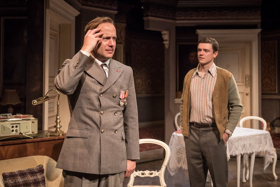Review: CELL MATES, Hampstead Theatre

![]() Offstage drama infamously hijacked the 1995 premiere of Simon Gray's play, with star Stephen Fry walking out mid-run - hastening the production's early closing. Here, then, is a chance to put the focus back on the work itself in Edward Hall's revival.
Offstage drama infamously hijacked the 1995 premiere of Simon Gray's play, with star Stephen Fry walking out mid-run - hastening the production's early closing. Here, then, is a chance to put the focus back on the work itself in Edward Hall's revival.
Inspired by a true story, the play centres on an extraordinary odd couple: notorious spy George Blake, sentenced to a record 42 years in Wormwood Scrubs, and the Irish petty criminal, Sean Bourke, who, in 1966, helped him escape - not with a grand KGB plan, but with a ladder made from rope and knitting needles and a waiting getaway car.
During a short stay in a nearby bedsit, an injured Blake persuades his fellow escapee to take him to Moscow, and to join him there for a quick visit before Bourke heads home to Ireland. A quick visit turns into months of incarceration of a different kind.
That concept of imprisonment - physical or mental, involuntary or of your own making - is the strongest thread in the piece. Whether we're in Scrubs's institutional gloom, a dank bedsit, or a sumptuous Moscow apartment complete with housekeeper and Champagne on tap (great designs from Michael Pavelka), the loss of free will, the uncertainty, and the corruption of relationships remains.
The central pair are well sketched by Emmet Byrne and Geoffrey Streatfeild. The former is all garrulous wit, voracious appetite and shrewd opportunism, until Bourke's changed circumstances reduce him to vodka-fuelled chaos - though even then, with a careful eye on the effect his behaviour has on his companion.
Streatfeild makes for a fascinating Blake: seemingly awkward and cautious, a natural outsider ruled by others' views of him, and at times a genuinely sympathetic figure, but with hints of the icy ruthlessness that sees him value his own plans more than the lives of others - sacrifices for "the greater good".
Yet there's an opacity in Gray's writing that hampers the drama. The two men are so paranoid about how their stories are told (reporting their versions of events into two separate recording machines) that it seems, on some level, to have affected Gray's portrait of them.
Does Blake miss his wife and children? Where does this Dutch-Egyptian man, who assumed British nationality and was then embraced by Russia, really consider home? We see some self-justification - does he believe in his actions, or is that purely for posterity? And what does Bourke actually think of him?
Most importantly, is their co-dependency really just based on a shared prison term and hatred of English authority, or is there something more? Both jokingly - or accusatorially - refer to it as a "marriage", but Gray swerves past any suggestion of intimacy. Their union, so crucial to the plot, remains fuzzy, and the denouement relies more on a sweeping generalisation of traitors than on these specific individuals.
As a result, the more concrete supporting characters almost steal the show. The best moment of pitch-black farce comes when ideological sympathiser Philip visits the fugitive pair in their bedsit. Panic sets in when Philip muddles the doorbell signal, then forgets if he's given it to his girlfriend, attending doctor Miranda.
The scene escalates into an amusing portrait of the gulf between high-minded CND protest and more grisly practical application, alongside a relationship breakdown. The surprise appearance of another figure - which terrifically ratchets up the tension - switches back over into comedy as the couple (still visible) resume their squabble as soon as they've fled the room.
Danny Lee Wynter, excellent as Philip, is equally good playing a dry KGB agent, whose melancholic outlook extends to his hopeless gymnast daughter - a specific character quirk missing from the main plot. Philip Bird plays a more genial but no less intimidating version of that agent, the duo creating necessary ambiguity in their watchful visits.
Cara Horgan also demonstrates impressive range, going from the no-nonsense, scolding Miranda to the subservient Russian housekeeper, who bonds with Bourke over Irish drinking songs - the latter a trope that Bourke wryly acknowledges is a national cliché.
That keen sense of what's real and what's constructed echoes through the play, but without enough depth or emotional resonance to completely engage us during a long piece. Though he remains an object of fascination, the spy never really comes in from the cold.
Cell Mates at Hampstead Theatre until 20 January, 2018
Photo credit: Marc Brenner
Reader Reviews

Videos

